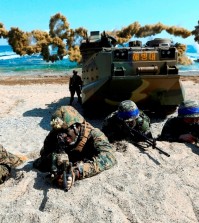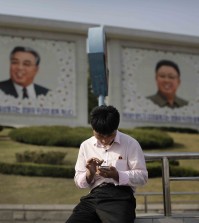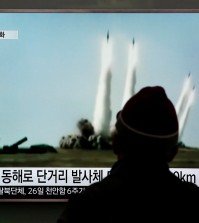- California Assembly OKs highest minimum wage in nation
- S. Korea unveils first graphic cigarette warnings
- US joins with South Korea, Japan in bid to deter North Korea
- LPGA golfer Chun In-gee finally back in action
- S. Korea won’t be top seed in final World Cup qualification round
- US men’s soccer misses 2nd straight Olympics
- US back on track in qualifying with 4-0 win over Guatemala
- High-intensity workout injuries spawn cottage industry
- CDC expands range of Zika mosquitoes into parts of Northeast
- Who knew? ‘The Walking Dead’ is helping families connect
Koreas exchange live fire near western sea border
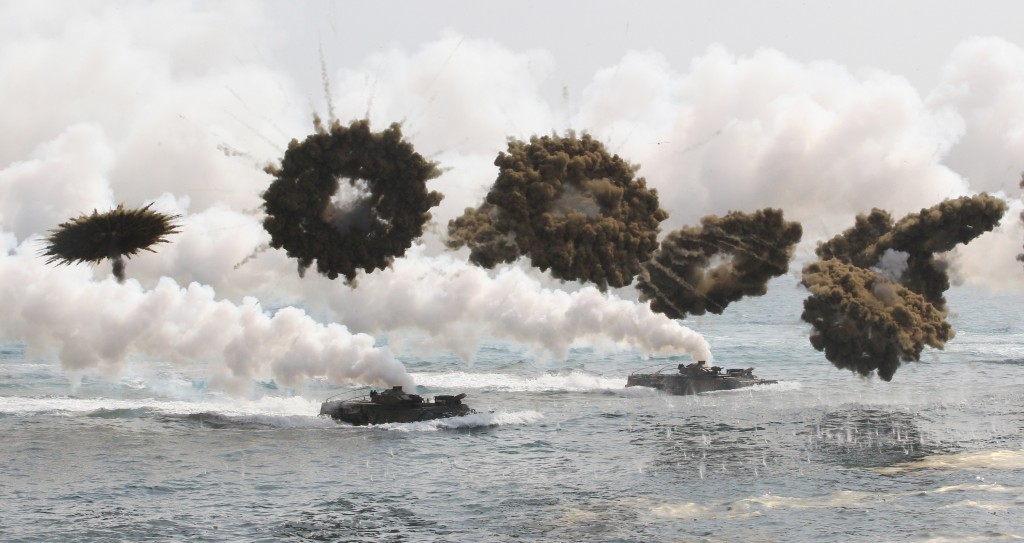
South Korean marine LVT-7 landing craft sail to shores through smoke screens during the U.S.-South Korea joint military exercises called Ssangyong, part of the Foal Eagle military exercises, in Pohang, South Korea, Monday, March 31, 2014. South Korea said North Korea has announced plans to conduct live-fire drills near the rivals’ disputed western sea boundary. The planned drills Monday come after an increase in threatening rhetoric from Pyongyang and a series of rocket and ballistic missile launches in an apparent protest against the annual military exercises by Seoul and Washington.(AP Photo/Ahn Young-joon)
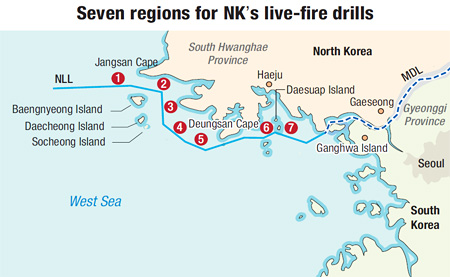 (Yonhap) — The two Koreas exchanged artillery fire across the western maritime border on Monday after the North staged a live-fire drill that sent artillery shells into southern waters and prompted the evacuation of South Korean islanders.
(Yonhap) — The two Koreas exchanged artillery fire across the western maritime border on Monday after the North staged a live-fire drill that sent artillery shells into southern waters and prompted the evacuation of South Korean islanders.
The North fired about 500 rounds of artillery shells into waters north of the Northern Limit Line (NLL) in the Yellow Sea from 12:15 p.m. to 3:30 p.m. KST, the Joint Chiefs of Staff (JCS) said.
After some 100 rounds fell south of the NLL, the South Korean military shot about 300 artillery shells into North Korean waters with K-9 self-propelled howitzers and dispatched F-15K fighter jets near the maritime border, it said.
“The South Korean and U.S. forces have stepped up their surveillance and vigilance with increased military assets in all parts of the nation to prepare for possible provocations,” defense ministry spokesman Kim Min-seok said in a briefing. “If North Korea uses the live-fire drill as an excuse to launch provocations near South Korean islands and shores, we will sternly respond.”
Residents in the border islands of Baengnyeong and Yeonpyeong, which lie less than 20 kilometers from North Korea’s coastal artillery bases, were evacuated to temporary shelters, officials said. No casualties or injuries have been reported.
The exercise took place after the Southwestern Command of the Korean People’s Army faxed South Korean Navy’s Second Fleet at 8:00 a.m. to announce the fire drills in seven border regions near the western maritime border.
“North Korea demanded South Korea to control its vessels in seven regions north of the NLL before it held the live-fire drills,” the JCS said. “We have banned vessels from entering the training zone for the safety of residents and sailors.”
It was the first time that the communist state announced a training zone that encompasses all western border regions ahead of a live-fire exercise, according to military officials.
The South Korean military said it has stepped up its guard against possible skirmishes, looking into Pyongyang’s intention behind the latest provocations.
“We consider that the North’s announcement contains hostile intentions to threaten South Korea,” Army Col. Wi Wong-seop, the vice defense ministry spokesman, said in a briefing ahead of the drill. “(North Korea) is believed to be creating a crisis situation on the Korean Peninsula by raising tensions near the western maritime border.”
Seoul officials have been on high alert as some artillery shells fired by the North fell south of the NLL during an August 2010 exercise, which was followed by shelling of a South Korean border island three months later.
The maritime border is a flash point where navies of the two sides fought bloody battles in 1999, 2002 and 2009.
Pyongyang does not recognize the NLL, drawn unilaterally by the U.S.-led United Nations Command when the 1950-53 Korean War ended, and demands that the line be drawn farther south.
In 2010, the North torpedoed a South Korean warship in the area and shelled Yeonpyeong Island, killing a total of 50 South Koreans.
Following the unprovoked North Korean attacks, South Korea has upgraded its defense capabilities along the western sea border, deploying an increased number of artillery batteries and precision-guided missiles on border islands.
North Korea has placed about 1,000 coastal artillery guns as well as multiple rocket launchers and anti-ship cruise missiles along the southwestern shore.
The communist state has also deployed about 70 hovercraft on its west coast and 60 of the amphibious vehicles in the east at its four hovercraft bases.
Most recently, Pyongyang has been building a new high-speed, wave piercing craft called Very Slender Vessel (VSV), which Seoul officials believe is aimed at infiltrating the inter-Korean sea boundary to quickly occupy South Korean border islands in case of war.
North Korea has been stepping up its rhetoric against annual joint drills between South Korea and the United States, firing a series of missiles and rockets in a show of force in recent weeks.
Pyongyang last week fired two mid-range ballistic missiles capable of striking Japan in the latest provocative launches, drawing condemnation from the U.N. Security Council.
In protest of the U.N. resolution, the North on Sunday said it will conduct a “new form of nuclear test” to bolster its nuclear deterrence, sharply stoking tensions on the Korean Peninsula.
Seoul’s defense ministry said it has not yet detected any signs of an imminent atomic test, noting it has strengthened surveillance to monitor the North Korean military’s moves.
The live-fire also comes one day after the North threatened to take revenge over alleged abuse of three North Korean fishermen who were captured by the South Korean Navy while crossing the western maritime border due to engine failure. The North Koreans were repatriated to their homeland according to their wishes the following day.
Seoul expressed deep regret over the North’s accusation and called on Pyongyang to halt acts that could raise tensions.







